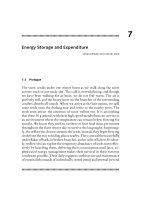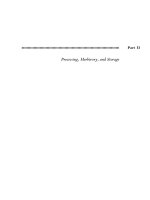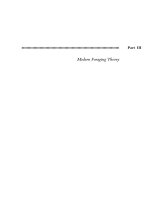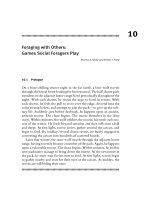Stephens & Foraging - Behavior and Ecology - Chapter 2 pdf

Stephens & Foraging - Behavior and Ecology - Chapter 2 pdf
... characteristic curve, as figure 2. 2 shows. A comparison of figures 2. 2A and 2. 2B shows how receiver operating characteristic curves differ between easy and difficult discrimination prob- lems. Part A shows ... interactions. 2. 7 The Behavioral Ecology of Information and Cognition Information problems connect behavioral ecology with basic behavioral mech- anisms such as learning,...
Ngày tải lên: 06/07/2014, 13:20

Stephens & Foraging - Behavior and Ecology - Chapter 4 pdf
... without ap- parent trial -and- error learning. Although pulling and stepping may be an in- nate motor pattern in birds (see review in Thorpe 1963), several ravens never Cognition for Foraging 125 concentration). ... trial and error (Chappell and Kacelnik 20 02) , and one individual bent a piece of wire into an appropriate tool (Weir et al. 20 02) . Synopsis Animals can use differ...
Ngày tải lên: 06/07/2014, 13:20

Stephens & Foraging - Behavior and Ecology - Chapter 7 pdf
... understand the selective forces that have shaped energy storage and expenditure strategies. Such models have become standard in evolutionary and behavioral ecology (Stephens and Krebs 1986; Mangel and ... procedures of Lilliendahl 1997; Pravosudov and 23 2 Anders Brodin and Colin W. Clark Animals also use carbohydrates as short-term fuel and fat as long-term fuel in many con...
Ngày tải lên: 06/07/2014, 13:20

Stephens & Foraging - Behavior and Ecology - Chapter 1 ppt
... general explana- tion for animals’ strong preference for immediacy. In an alternative approach, Stephens and colleagues (Stephens 20 02; Ste- phens and Anderson 20 01; Stephens and McLinn 20 03) have ... prob- lems within behavioral ecology, spurred on by a long-standing interest in sex- ual signaling and other forms of communication (Dall and Johnstone 20 02) , that may r...
Ngày tải lên: 06/07/2014, 13:20

Stephens & Foraging - Behavior and Ecology - Chapter 3 ppt
... agonist that most effectively mim- ics the effect of glutamate, including the NMDA (N-methyl-D-aspar- tic acid) receptor and the AMPA (α-amino-3-hydroxy-5-methyl- 4- isoxazoleproprionate) receptor. Neuropil ... examined this issuetheoretically and empir- ically (Devenport and Devenport 1994; Hirvonen et al. 1999; Kacelnik and Todd 19 92; Shettleworth and Plowright 19 92; Stephen...
Ngày tải lên: 06/07/2014, 13:20

Stephens & Foraging - Behavior and Ecology - Chapter 5 pps
... (e 1 /h 1 e 2 /h 2 and e 1 /b 1 > e 2 /b 2 ). Second, profitability is greater for resource 1, but food richness is greater for resource 2 (e 1 /h 1 > e 2 /h 2 and e 2 /b 2 > e 1 /b 1 ). These ... solve for R 2 in terms of R 1 : R 2 = k a 2 (e 2 − h 2 k) − a 1 (e 1 − h 1 k) a 2 (e 2 − h 2 k) R 1 . (5.1 .2) (Box 5.1 continued) In the state spa...
Ngày tải lên: 06/07/2014, 13:20

Stephens & Foraging - Behavior and Ecology - Chapter 6 docx
... (Mason et al. 20 06) showed that ungulates are inherently prone to abnormal oral behaviors (fig. 6 .2. 2), with wall-licking giraffes (Bashaw et al. 20 01), tongue-rolling okapis, and dirt-eating Przewalski’s ... herbivore foraging behavior, we must under- stand the dynamics of plant growth. We need to become experts, not just on animal behavior, but also on plant growth and metaboli...
Ngày tải lên: 06/07/2014, 13:20

Stephens & Foraging - Behavior and Ecology - Chapter 8 doc
... on the self-feeding rate and the tactical options avail- able, as described in equations (8.1) and (8 .2) . The three lines labeled i = 1, 2, 3 represent three succes- sively higher-workload delivery ... accommodate rate-maximizing and efficiency-maximizing behavior within a single frame- work. Few studies have tested this critical prediction. (Figures 8.1 and 8 .2 show measured b...
Ngày tải lên: 06/07/2014, 13:20

Stephens & Foraging - Behavior and Ecology - Chapter 9 docx
... effects in commu- nities (e.g., Anholt et al. 20 00; Peacor and Werner 20 00). Adaptive behavior tends to destabilize population dynamics (Luttbeg and Schmitz 20 00; Mc- Namara 20 01), but behavior based ... al. 1996; Veasey et al. 20 01; Kullberg, Houston, and Metcalfe 20 02; Kullberg, Metcalfe, and Houston 20 02) . 328 Peter A. Bednekoff could make a difference. Factors...
Ngày tải lên: 06/07/2014, 13:20

Stephens & Foraging - Behavior and Ecology - Chapter 10 pps
... routes to cooperation and restraint. For exam- ple, recent theoretical (Nowak and Sigmund 1998) and experimental work (Wedekind and Milinski 20 00; Milinski et al. 20 02, 20 06) suggest that indirect reciprocity, ... co- operate. Instead, Clements and Stephens saw cooperation only in by-product mutualism (i.e., when neither individual had any incentive to defect). In follow-up...
Ngày tải lên: 06/07/2014, 13:20